- Free schools for IDP children in Arakan State struggle to stay open amid funding shortfall
- Female-headed IDP households in Ponnagyun Twsp struggle as commodity prices surge
- Min Aung Hlaing likely to take State Counsellor role in post-election government formation: Analysts
- Hindus express hope for educational reform under AA administration
- Arakanese zat pwe performers struggle to survive as conflict halts traditional shows
The plight of farmers stuck between Chinese projects and fighting in Arakan
Thousands of local farmers from about 30 villages in Kyaukphyu Township were forced to flee from landmines planted by the regime, junta raids and artillery attacks. Locals are not interested in the implementation of the Kyaukphyu SEZ project.
29 Aug 2024
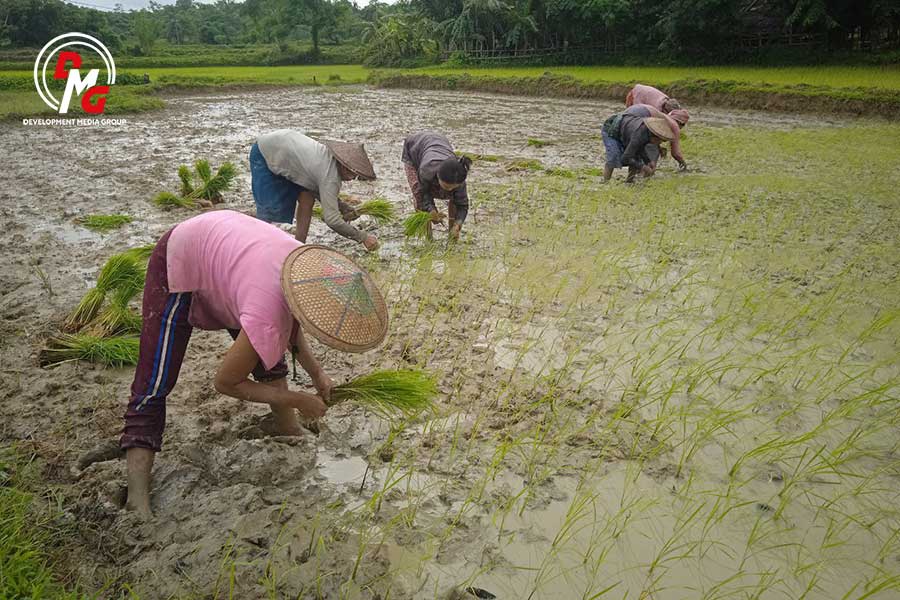
By DMG
U Hla Thein, a resident of a coastal village on the Bay of Bengal in western Myanmar, was lost in thought, gazing at his farm.
"We are worried about what the future holds for our farms, our source of livelihood," the 50- year-old farmer said as he heaved a deep sigh.
A resident of Pyar Tae village, Kepapyae village-tract in Arakan State's Kyaukphyu Township, U Hla Thein grows paddy and other crops to support his family. He worries that his ancestral farms will be seized to make way for the China-backed Kyaukphyu Special Economic Zone (SEZ) project.
Kyaukphyu SEZ
Kyaukphu SEZ is a planned infrastructure project with three components: a deep-sea port (607.88 acres), an industrial park (2446.07 acres), and an integrated residential area (1235.37 acres).
The deep-sea port will provide China with direct access to the Indian Ocean, allowing Chinese trade to bypass the congested Strait of Malacca while boosting development in its landlocked Yunnan Province, which borders Myanmar.
More than a decade has elapsed since the US$ 7.3 billion project was initiated in 2013. China's state-owned China International Trust and Investment Corporation (CITIC) initially won the tender to develop Kyaukphyu SEZ in 2013 under U Thein Sein's government.
Under the initial agreement, the Chinese developer held an 85 percent stake in the project, and the Myanmar side held 15 percent. The National League for Democracy (NLD) government later increased Myanmar's stake to 30 percent in November 2018.
The project site now spans Kyaukphyu, Ramree and Manaung townships, covering 4289.32 acres in total, according to an announcement by the Central Committee for Myanmar Special Economic Zone on December 29, 2015.
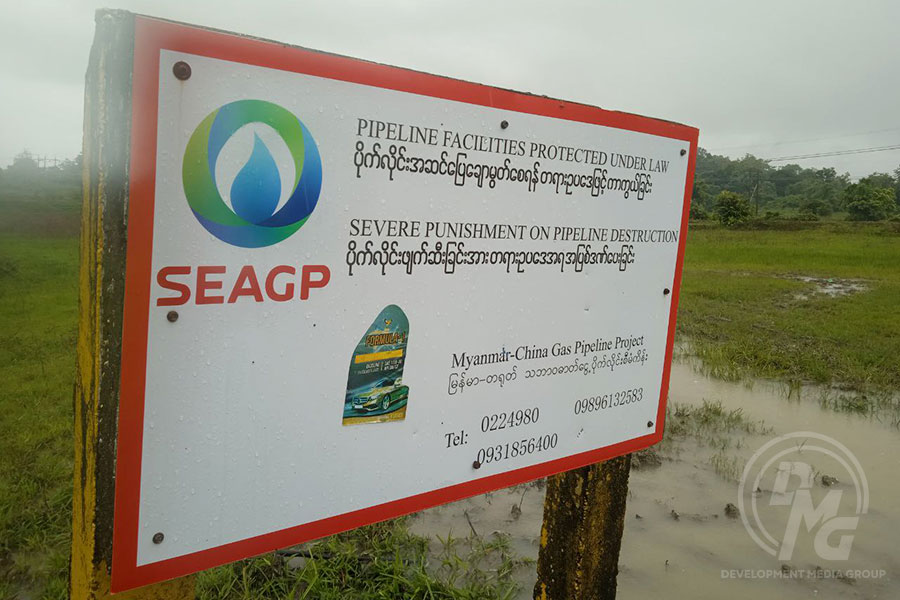
Landlords poised to become squatters
The proposed sites include water sources, farmland, and pastures in nine village-tracts on Maday and Ramree islands.
Project development could infringe on key livelihoods like agriculture and fisheries. Residents, however, have largely been kept in the dark.
Daw May Latt Kyi from Pyar Tae village said: "I was told that my farm would be grabbed to make way for the project. But I still don't know the details."
Her seven-acre farm sits on the planned industrial park whose construction was delayed by the Covid-19 pandemic.
Altogether, nearly 250 acres of farmland owned by 72 farmers has been earmarked for the industrial park project.
Notably, DMG reporters found that three individuals, including the former President U Thein Sein, have obtained La/Na 39 certificates to obtain 61.60 acres of farmland from 22 farmers on these sites. La/Na 39 certificates permit farmland to be developed for an alternate purpose and are valid for 35 years.
These 22 farmers have not only lost their ancestral land. They have, effectively, become squatters, and are at risk of a lawsuit.
According to the Kyaukphyu District General Administration Department, of the 250 acres of land earmarked for the industrial park, 61.60 acres are now designated as former farmland, for which Na La/Na 39 certificates have been granted.
The department claims that 22 farmers are now working illegally on 61.60 acres of land owned by three individuals.
The junta's farmland ownership and farmland statistics committee and former Lower House lawmaker U Ba Shein of the Arakan National Party (ANP) met local farmers in Pyar Tae and Thaing Chaung villages in Kyaukphyu Township in October 2021, said farmer U Hla Thein.
"They said we should be prosecuted for illegally working on the farmland without the knowledge of the government," said U Hla Thein.
Ko Khin Oo from Kyaukphyu SEZ Watch told DMG: "Farmers who have worked on their own farms for many years have been labelled as squatters. It is unacceptable."
He called on authorities and concerned companies to explain publicly how former President U Thein Sein and two others acquired the ownership of those farms. Local farmers said they would not accept if the regime tried to confiscate their farmland without a satisfactory explanation.
Lessons from the Past
Locals complain that they have yet to be consulted about Kyaukphyu SEZ. They are concerned that they may not receive compensation or will be given little compensation for their land, citing the experiences of fellow residents whose livelihoods were robbed by another China- backed project in the area - the Shwe oil and gas pipeline project.
Ma Tin Wai Khaing, resident of Maday Island, said she was worried that Kyaukphyu SEZ would take away their traditional sources of livelihood.
"What are we, Maday Island, supposed to do to earn our living when they start the project? I don't think we will be hired by companies that will come to operate," said Ma Tin Win Khaing, expressing concerns about the deep-sea port project on Maday Island.
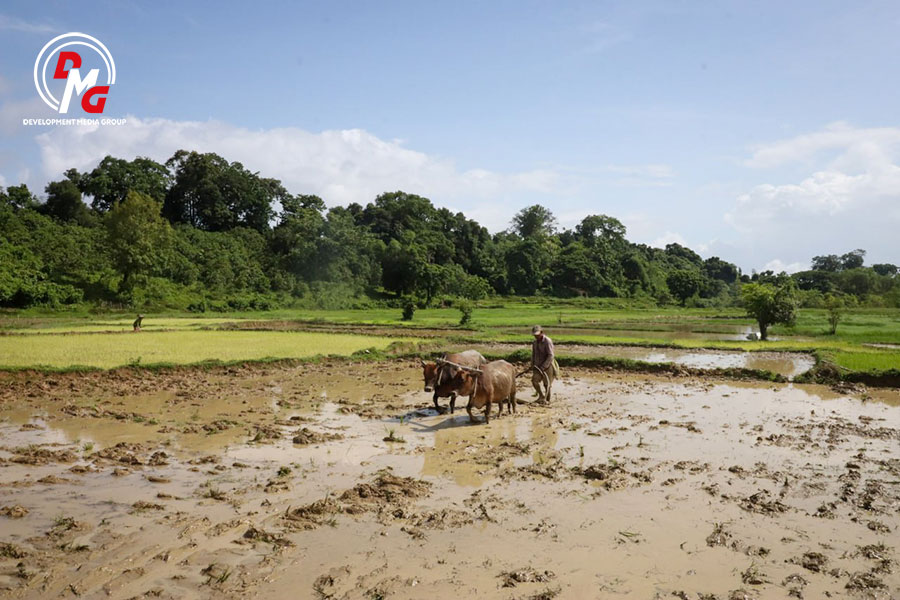
In 2010, over 90 acres of farms owned by 110 farmers in Gonechin, Ohntaw and Mala Island villages were taken for the Shwe natural gas project. Farmers received 2.5 million kyats per acre, a figure widely considered to be significantly lower than market value.
Seeking remedy, in 2016, twenty farmers filed a lawsuit against the operator of Shwe gas project, South Korea's POSCO International Co.
The court ruled in December 2022 that the state-owned Myanmar Oil and Gas Enterprise (MOGE), rather than POSCO, was primarily responsible for the land confiscation, prompting POSCO to seek to recover its legal costs.
The company sent a notice in June 2023 asking farmers to pay 27,149,500 South Korean won (then 43.6 million kyats or USD 20,000) in legal costs, which was ultimately paid for by the farmers' legal representative, Igong Law Firm.
A farmer from Gonechin village said: "We didn't get back our farms as we lost the lawsuit. It is a big loss for farmers."
Local farmers who have learned from the incident now have no confidence in the Kyaukphyu SEZ project and are worried they will similarly lose their farmland.
Many farmers reportedly sold their farmlands as soon as they heard about the construction of the Kyaukphyu SEZ, fearing their farmlands would be confiscated.
Other tracts of farmland in the Kyaukphyu SEZ project area are in the process of acquisition by businessmen. Others have yet to sell out of fear for losing their livelihood.
"We don't want to sell our farmlands. We earn a living by farming. If I sell the farmlands, the money will be gone soon. If I have the farmlands, I can make a living by farming," said a female farmer from Kandi Village.
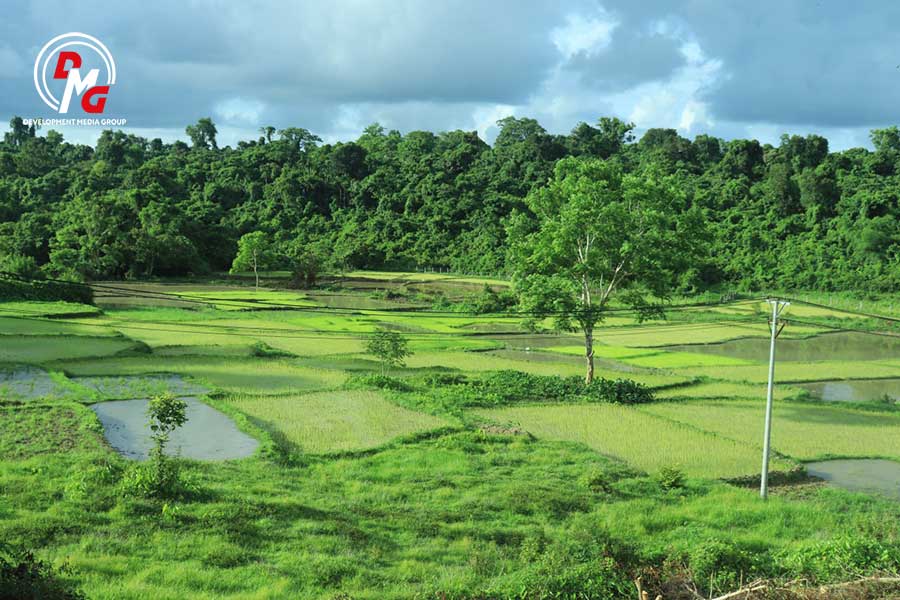
Project officials say they will create job opportunities for the locals. However, when the Sino-Myanmar oil and gas pipeline project was implemented, residents did not receive any tangible benefits and were only offered low-skill, low-paying jobs such as security guards and cleaners.
If their farmlands end up confiscated for the Kyaukphyu SEZ Project, the farmers want employment opportunities or alternative farmlands.
"Our farmlands are located in the Kyaukphyu SEZ project area, and if we have to sell them, our social life and family's livelihood may suffer greatly. We want the local authorities and project officials to create alternative jobs to make the livelihood of the locals comfortable," said U Aung Than Swe, a local farmer from Maday Island.
CITIC Group Chairman Mr. Chang Zhenming said that after the implementation of the Kyaukphyu SEZ project, management positions would be assigned to local residents, and that after 10 years of operation, about 90 percent of management positions would be filled by local residents.
He made the remarks at the signing of a framework agreement with the Kyaukphyu Special Economic Zone Management Committee in November 2018. The Institute for Strategy and Policy - Myanmar (ISP - Myanmar) reported that the Kyaukphyu SEZ project will create more than 100,000 job opportunities for residents, and that 90 percent of management jobs will be staffed by local workers after 10 years of operation.
However, there is grounds for skepticism. According to ISP - Myanmar, only a few hundred people can be employed at ports much larger than the Kyaukphyu deep-sea port project.
Junta attempts to revive Kyaukphyu SEZ Project
The latest fighting between the military and Arakkha Army (AA) began in Arakan State on November 13, 2023.
The renewed fighting is different than hostilities that took place in Arakan State between 2018 and 2022, when the AA seized control of dozens of junta bases, military camps, police outposts, and even conducted battles for control of towns.
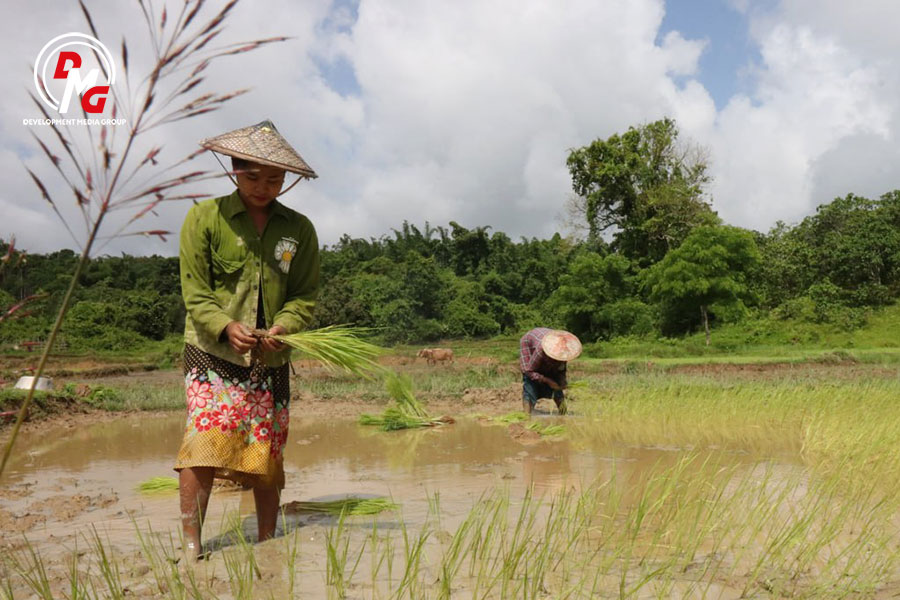
Fighting has now been raging for more than nine months in Arakan State. The AA has seized nine of Arakan State's 17 townships, as well as Paletwa Township in neighbouring Chin State. The AA is attempting to seize Maungdaw and Thandwe Townships and has surrounded junta battalions and military headquarters in Sittwe, Ann, Kyaukphyu and Taungup Townships.
In a message marking the 15th anniversary of the founding of the AA on April 10, 2024, AA chief Twan Mrat Naing urged residents in Arakan State to brace for the decisive battle in the state.
Observers say that the regime, which is facing a military defeat, is trying to implement the Kyaukphyu SEZ project as soon as possible.
The regime is trying to protect the Kyaukphyu SEZ project so that it does not lose the Kyaukphyu region to the AA, said U Tun Kyi, a Chinese project observer.
"The regime wants to protect Kyaukphyu with Chinese projects. In other words, it can be understood that the regime is trying to protect the lost territories and protect the Kyaukphyu region," he added.
Amid the fighting in Arakan State, the regime is trying to implement the Kyaukphyu SEZ project quickly. Observers say China, by contrast, has paused its development due to the fighting.
For example, the environmental and social impact assessment for the US$1.3 billion Kyaukphyu Special Economic Zone (SEZ) project has not been completed. Myanmar Survey Research (MSR), the implementor of the assessment, reportedly halted its work for the Kyaukphyu Special Economic Zone (SEZ) project as a result of the fighting.
Myanmar's military regime has reportedly banned travel in the waters surrounding Maday Island for two and a half months, saying it will carry out work related to the Chinese-backed projects there. The regime announced on July 2 that waterway repair and dredging work would be carried out from July 15 to September 30 to allow large oil tankers to enter and exit the port on Maday Island.
Although the regime is charged with developing the Kyaukphyu deep-sea port project, some observers believe the AA will ultimately be responsible due to its stronghold in Arakan State.
"The regime's implementation of the Kyaukphyu deep-sea port project is good, but I don't think it will be able to complete it. I think ULA should take over and implement the Kyaukphyu deep-sea port project at some point," said U Pe Than, a military and political observer.
AA chief Maj.General Twan Mrat Naing on April 10 urged residents to evacuate their homes in Sittwe and Kyaukphyu as the AA prepared for a decisive battle for control of Arakan State.
Fighting has stalled for the moment, but there have been at least five clashes between the AA and the regime close to the Chinese project. The AA seized Ramree Township, which is meant to link with Kyaukphyu SEZ, on March 11, 2024.
According to military sources, the regime only controls Maday Island in Kyaukphyu Township, where the bulk of Chinese projects are located, and about 12 villages. The AA controls the remainder, according to military sources.
The junta's Light Infantry Battalion Nos. 542 and 543, Infantry Battalion No. 34, the Danyawaddy naval base, Taung Maw Gyi sub-naval station and a police battalion are all based in Kyaukphyu.
Life of farmers in project area amid ongoing fighting
Despite the latest fighting in Arakan State, the residents in the project area are continuing to farm as usual.
"The regime and the Chinese company have not yet implemented the Kyaukphyu SEZ project due to the fighting between the military and the AA. Local farmers in the project do farming as usual," said U Hla Thein, a local farmer from Pyar Tae Village.
However, not all local residents in the project area are able to engage in farming and shifting cultivation. Due to the danger of landmines planted by the military, some farmers are unable to work in agriculture.
At least 120 farmers from 18 villages in Arakan State's Kyaukphyu Township say they cannot grow paddy due to the risk of landmines planted by the regime. Junta troops were stationed in those villages and surrounding areas during raids in January and March 2024.
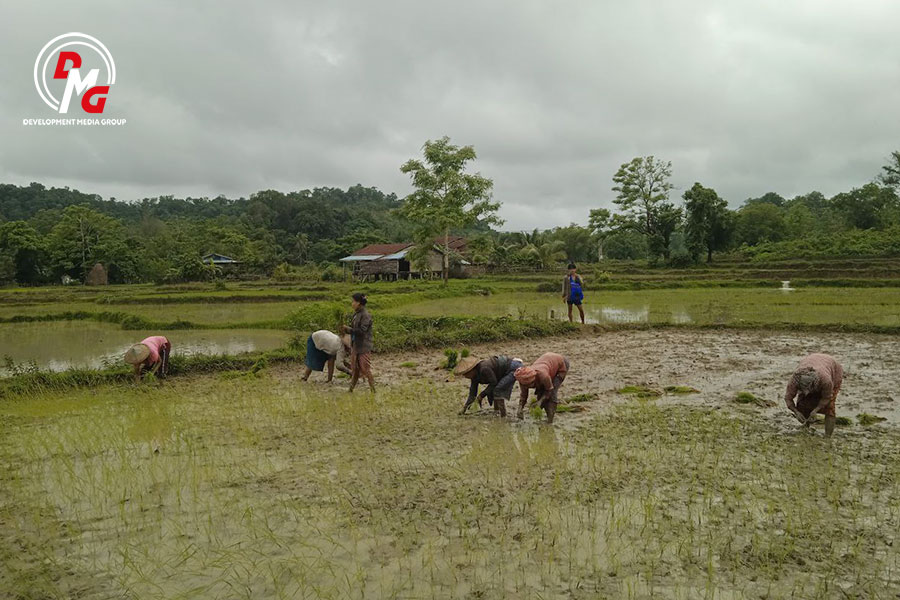
Mines have frequently exploded in paddy fields and forests and mountains near paddy fields. Local farmers said they are worried about their safety as cattle have also often been injured or killed in landmine explosions in Kyaukphyu Township.
"They [junta soldiers] have planted landmines in many places. Many people dare not go to their farms as they can't see where landmines are planted," said a local woman from Kandi Village in the project area.
Mine blasts have killed or injured more than 20 civilians in Kyaukphyu Township since renewed fighting broke out in November of last year. Residents say they are experiencing daily losses due to the risk of landmines planted by the regime rather than the losses caused by the Kyaukphyu SEZ project.
The regime blockaded roads and banned sea travel in the waters near Kyaukphyu Town following the fighting. As a result, food supplies began to run out less than one month after the blockade was instituted. Civilian casualties are reported due to the military's increased deployments of troops, artillery strikes on residential areas and drone attacks.
Thousands of local farmers from about 30 villages in Kyaukphyu Township were forced to flee from landmines planted by the regime, junta raids and artillery attacks. Locals are not interested in the implementation of the Kyaukphyu SEZ project.
In any case, U Hla Thein, a farmer on behalf of the local farmers, said clearly that if the groups that will implement the Kyaukphyu SEZ project are not responsible and transparent, the residents will not accept the project at all.
"We have no idea whether the government or the Chinese company will take over the Kyaukphyu SEZ project. No one has taken responsibility for the Kyaukphyu SEZ project, and the farmers have no plans to accept the project," he said.







.jpg)












